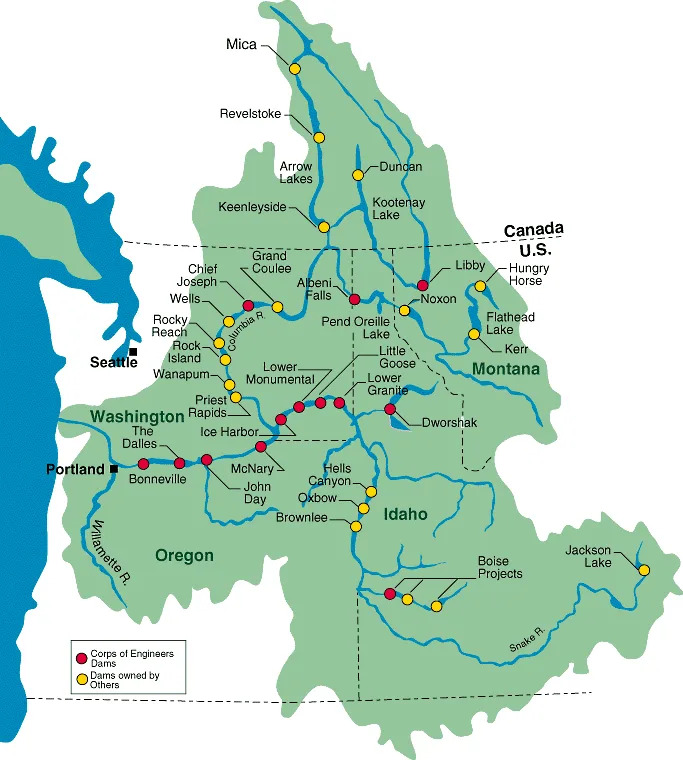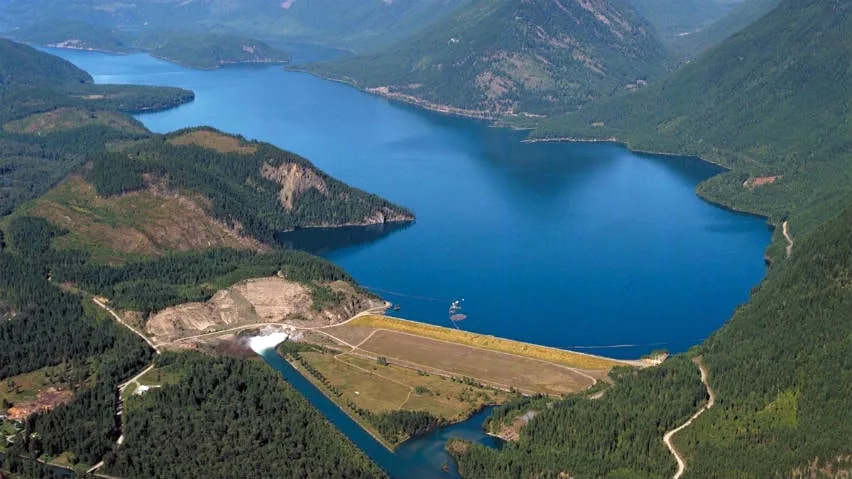CBC
Sun, September 24, 2023

The Dalles Dam is located on the Columbia River about 140 kilometres east of Portland, Ore. Canada and the U.S. are negotiating the future of a treaty that helps control water flow and hydroelectric power benefits from dams along the Columbia.
(Jessie Wardarski/AP - image credit)
Walk along the banks of the Columbia River in B.C. and you might be forgiven for thinking it's like any of the province's other big waterways. You might spot a sturgeon, or glimpse one of the more than 60 dams in the Columbia's watershed.
But the Columbia is not like other rivers. For one, it crosses the U.S. border to empty into the Pacific in Oregon. The Columbia River basin is also a vital source of electricity, providing about 40 per cent ofall U.S. hydroelectric power, while B.C. draws almost half of its total electrical generation from the region.
Those dams also provide flood control, in an effort to avoid a repeat of the massive1948 floods that left about 50 people dead and 46,000 without homes.
But what makes the river truly special is the unique treaty that governs those dams.
Hammered out between Canada and the United States and ratified in 1964, the treaty outlines control of the river's water flow and benefits from that bonanza of hydroelectric power, including the tens of millions of dollars a year that come with it.
The Columbia River Treaty is being negotiated again — a process that has already lasted years — and the potential deal could have profound consequences both for the electrical output of the river and the people and wildlife that depend on it.
In an interview on CBC Radio's The House that aired Saturday, B.C.'s chief negotiator, Kathy Eichenberger, said the Canadian government had a few key priorities, including retaining greater flexibility over water flows in Canada and adding considerations around the river ecosystem "as a third leg of the stool of the treaty that is based on power generation and and flood control."
Negotiators have been locked in round after round of talks, with the 19th round scheduled for October in Portland, Ore.
Some provisions of the treaty are set to expire in September 2024, after which Canada could provide flood control services to the United States on an ad hoc basis.
"We need to take the time to improve a treaty that's in dire need of renewal and incorporating things like ecosystems, salmon, adaptive management, climate change," Eichenberger told host Catherine Cullen.
"These are all new concepts that weren't discussed in the original treaty," she said.
Value of the 'Canadian Entitlement'
The Americans have their own concerns for the revised treaty, with the value of hydroelectric power going back to Canada perhaps first and foremost.
That share of the power is called the "Canadian Entitlement"
"We're giving Canada a giant power plant's worth of output every year," Scott Simms, chair of the Columbia River Treaty Power Group, told The Seattle Times in August. "It might be transactionally easier to push wheelbarrows of cash up and dump them at the Canadian border."
Eichenberger countered that Canada believed it could prove that what it receives is half of the incremental benefit of power generation.
Walk along the banks of the Columbia River in B.C. and you might be forgiven for thinking it's like any of the province's other big waterways. You might spot a sturgeon, or glimpse one of the more than 60 dams in the Columbia's watershed.
But the Columbia is not like other rivers. For one, it crosses the U.S. border to empty into the Pacific in Oregon. The Columbia River basin is also a vital source of electricity, providing about 40 per cent ofall U.S. hydroelectric power, while B.C. draws almost half of its total electrical generation from the region.
Those dams also provide flood control, in an effort to avoid a repeat of the massive1948 floods that left about 50 people dead and 46,000 without homes.
But what makes the river truly special is the unique treaty that governs those dams.
Hammered out between Canada and the United States and ratified in 1964, the treaty outlines control of the river's water flow and benefits from that bonanza of hydroelectric power, including the tens of millions of dollars a year that come with it.
The Columbia River Treaty is being negotiated again — a process that has already lasted years — and the potential deal could have profound consequences both for the electrical output of the river and the people and wildlife that depend on it.
In an interview on CBC Radio's The House that aired Saturday, B.C.'s chief negotiator, Kathy Eichenberger, said the Canadian government had a few key priorities, including retaining greater flexibility over water flows in Canada and adding considerations around the river ecosystem "as a third leg of the stool of the treaty that is based on power generation and and flood control."
Negotiators have been locked in round after round of talks, with the 19th round scheduled for October in Portland, Ore.
Some provisions of the treaty are set to expire in September 2024, after which Canada could provide flood control services to the United States on an ad hoc basis.
"We need to take the time to improve a treaty that's in dire need of renewal and incorporating things like ecosystems, salmon, adaptive management, climate change," Eichenberger told host Catherine Cullen.
"These are all new concepts that weren't discussed in the original treaty," she said.
Value of the 'Canadian Entitlement'
The Americans have their own concerns for the revised treaty, with the value of hydroelectric power going back to Canada perhaps first and foremost.
That share of the power is called the "Canadian Entitlement"
"We're giving Canada a giant power plant's worth of output every year," Scott Simms, chair of the Columbia River Treaty Power Group, told The Seattle Times in August. "It might be transactionally easier to push wheelbarrows of cash up and dump them at the Canadian border."
Eichenberger countered that Canada believed it could prove that what it receives is half of the incremental benefit of power generation.

Dams on the Columbia River and its tributaries
Dams on the Columbia River and its tributaries (U.S. Army Corp of Engineers)
"How we manage flows in Canada really increases [the Americans'] ability to generate more electricity to meet their citizens and industrial needs," Eichenberger said.
"That's the fundamental principle of the treaty … creating a benefit and sharing it equitably. And that's our North Star," she said.
Seeking protection for the ecosystem
Even though Columbia River region ecosystems were not a primary concern in the original negotiations, they have long been a concern of Indigenous groups, who are now a prominent part of the Canadian negotiating team.
Fish stocks, particularly around salmon, are a major concern.
"[Salmon is] beyond just important for our people," Penticton Indian Band elder Chad Eneas told Bob Keating, a freelance journalist who spoke with people around the valley as part of a documentary for The House.
"I think it's important in terms of it being a keystone species in the Columbia."
Others who live or work alongside the river have different concerns, such as the impact of lands lost when dams and reservoirs were built along the river.
Twin sisters Janet and Crystal Spicer were raised in a Nakusp, B.C., family that farmed near the Arrow Lakes, which is part of the Columbia River system. The farm was lost when the Hugh Keenleyside Dam was constructed in 1968.
"The whole thing is so short-sighted. And it's irrecoverable. That's the thing. It's not like it can be put back. It can't. I think it was a shocking act of violence and cruelty to just drown us out," said Janet Spicer, who still grows on what's left of a property farmed by her father.

The Duncan Dam in the Purcell Mountains is one of three B.C. dams built as part of the Columbia River Treaty, signed with the U.S. in 1964. In return for building the Mica, Keenleyside and Duncan dams, which provide water storage for power generation in the U.S., B.C. is entitled to half the additional power generated because of the water storage.
The Duncan Dam in the Purcell Mountains is one of three B.C. dams built as part of the Columbia River Treaty, signed with the U.S. in 1964. In return for building the Mica, Keenleyside and Duncan dams, which provide water storage for power generation in the U.S., B.C. is entitled to half the additional power generated because of the water storage. (Government of B.C.)
"The farmland won't come back, but people want a living river," added her sister Crystal Spicer.
Canadians along the river have been advocating for Canada to retain greater control of water flows to make the fluctuation less dramatic and less destructive to ecosystems.
Author Eileen Delahanty Pearkes said it's key that the river's ecosystem and residents are kept in mind at the negotiating table.
"All of the health of the land and water in this region depends on flow. The details of it are less important — Canada getting this or the U.S. getting that," she said.
"I love the words of one Indigenous advocate: 'One river for the benefit of all.'"
No comments:
Post a Comment